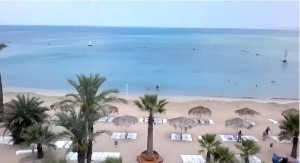Latakia’s Tourism Sector Devastated by War

Raheel Ibrahim
Anyone who visited the city of Latakia before the start of the crisis in Syria would remember how full it was on weekends, beginning in Spring: people sitting in cafes from the early morning hours or strolling along the corniche, while groups of tourists flocked to the archaeological sites, beaches and the mountains surrounding the city.

These days, Latakia seems like a completely different city: no one has visited the museum in two years, according to the guards, while the restaurants are empty except for employees.
The Syrian tourism sector has been devastated by the crisis. According to the Ministry of Tourism’s latest annual report, the number of tourists coming to Syria fell from 3.8 million in 2011 to 600,000 tourists in 2012, most of whom are probably pilgrims who have visited the Shiite holy shrines in Damascus. In addition to the huge decline in the number of tourists, restaurant and hotel owners complain of the skyrocketing prices of fuel and food, as well as ongoing power outages. Most employees of these establishments have either been let go or had a pay cut.
Nasr, 30, used to work in a tourist resort in Latakia, but he lost his job after the number of customers fell to less than half what it had been before.
“After five years of work, I suddenly found myself out of a job when they started laying off employees,” said Nasr. “I didn’t complain. Many people are in the same boat.”
The recession brought on by the war has also affected one of Latakia’s most famous five-star restaurants, one of its managers told The Damascus Bureau.
The manager, who declined to be named, described the situation as “catastrophic,” adding that the number of patrons does not exceed ten per day.
The manager attributed this steep decline to a large number of customers boycotting the restaurant for political reasons, because the owner is a prominent businessman closely linked to the regime. Many also avoid the restaurant due to its location near the area of Slaibeh, which occasionally witnesses clashes between regime forces and the armed opposition.
Checkpoints have been set up throughout the city, especially areas such as Al Raml, where fighting erupted last summer. This, combined with rumours of kidnappings, scares residents into staying home, although Latakia still enjoys relative stability compared to other regions of Syria.
Unlike the restaurants, the chalets for rent in various areas are all packed, albeit not with the usual customers. Displaced Syrians, mostly from Aleppo, have replaced foreign and local tourists. The chalets’ owners, however, deny they are making up the losses they have incurred as a result of the crisis.
“High occupancy does not mean profit,” says Zuhair, the owner of a chalet in Ras Al-Baseet near the city of Latakia. “The displaced cannot pay, most of them don’t have jobs and those who do have limited income. Those who do have the means to pay stay just long enough to rent their own apartment.”
But as a result of high demand, daily rates have doubled since last year, and owners have started leasing on a monthly basis, with the average rent hovering around 15,000 Syrian pounds (about $150), which is beyond the means of many displaced.
“We are one of three families living in a chalet composed of two rooms and a hall for 20,000 Syrian pounds [$200 a month],” said Sadiq, who fled his hometown of Aleppo. “Prices have gone up so much it’s become exploitative.”
The status quo looks likely to continue well into the summer. Continued fighting in parts of Syria does not suggest that the high season will be better for business owners, or that the city of Aleppo will see an end to the fighting, allowing the displaced to return to their homes.
For those who have lost their jobs, most no longer see any reason to stay in Syria. Nasr has decided to travel to Lebanon where he will look for a job.
“Syrians’ conditions are not good in Lebanon, but I have no choice,” said Nasr. “I have no work waiting for me, and I think the only jobs I will find will be either in a restaurant or on a construction site.”
